Convenience culture seduces us into imagining that we might find room for everything important by eliminating only life’s tedious tasks. But it’s a lie. You have to choose a few things, sacrifice everything else, and deal with the inevitable sense of loss that results.
Oliver Burkeman, “Four Thousand Weeks: Time Management for Mortals“
Reading these words was like having a veil lifted from my eyes. I could finally see, could finally breathe after feeling trapped by my ADHD, poor time management, and chronic perfectionistic procrastination.
Oliver Burkeman's book is one of 6 best books about ADHD — that aren't intentionally about ADHD — and that forever changed my attitude and behavior. I'm going to share all my favorites with you below. First, let me explain why these books were so crucial to my ADHD success.
You Don’t Know What You Don’t Know
15 years ago, as a sophomore in college, I was diagnosed with ADHD. To be honest, even though all of my symptoms were classic ADHD (predominantly inattentive), I was in denial for a loooong time. Like – 10 years worth of time.
To be fair, back in 2008 ADHD wasn’t as widely talked about as it is now, so my awareness was limited. There were some painfully boring self-help books with titles like “ADHD and You,” but I couldn't get through them. In the end, I decided to just rely on my meds and carry on with my life. But even on meds, I made some silly, some risky, and some downright dangerous mistakes, even mortifyingly embarrassing myself and getting fired.
I eventually got my act together (I had to reinvent myself first, in classic ADHD style) and successfully held down a job as a teacher for almost a decade. Still, I wasn’t making much progress on the ADHD front other than overcompensating for and masking my symptoms.
The turning point came when my husband decided to start a family, so I stopped taking medication (for the first time in 10 years) a few months before we began trying. It was hard AF. The silver lining was that I finally decided to educate myself on ADHD. I knew that I had at least 18 months of no meds ahead of me (after pregnancy I planned on breastfeeding) so I decided it was time to figure out something so that my life didn’t completely fall apart in the interim. Thanks in part to the books below, I got way more than I expected.
6 Books That Will Change Your Neurodivergent Life
“Fatter, Sicker, Poorer: The Urgent Threat of Hormone-Disrupting Chemicals to Our Health and Future and What We Can Do About It” by Leo Trasande.
Okay, I know the title “Fatter, Sicker, Poorer” is depressing AF, but if you have the stomach for it, I recommend it. One of the first topics I really dove into was environmental toxins and how they could contribute to ADHD. Things like asbestos in our beauty products and lead in our water.
Going down that rabbit hole is not for the faint at heart, let me tell ya. But it’s an important piece of the puzzle and so brings me to my first book recommendation. As grim as it was, it got me thinking about the changes (often small and often inexpensive!) that I could make to potentially impact my own children’s chances of developing ADHD.
This empowering knowledge I learned from this book didn’t really help me in the present, but eliminating hormone disruptors from my home and personal care products goes a long way in affecting my and my kids’ future.
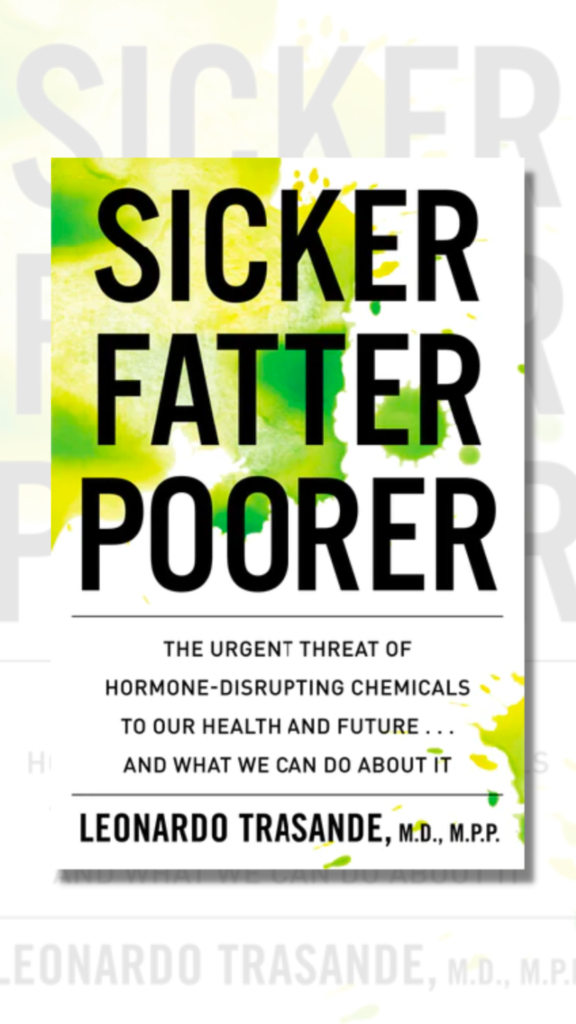
“How to Do The Work: Recognize Your Patterns, Heal From Your Past, and Create Your Self” by Dr. Nicole LePera
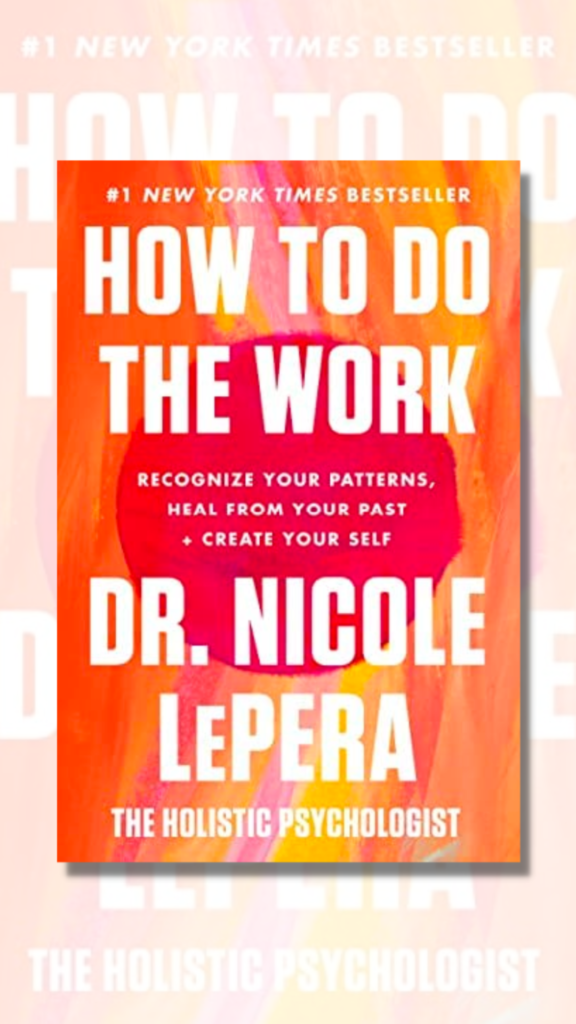
One of the areas that I struggled with most was my feelings of shame, guilt, and inadequacy because of my ADHD. I started digging into mental health podcasts and books and that brought me to Dr. Nicole LePera’s book “How To Do The Work“. Every chapter had me taking notes or crying. Usually both. When I finished it I felt like I had just gone through incredibly effective (and incredibly inexpensive) therapy.
Okay, so I knowwww Dr. LePera is a controversial figure in the psychology space, but I’m going to separate the art from the artist in this case. You can do your own digging and form your own opinion of her, but I do believe most of what she says carries weight. Her social media profiles are chock full of helpful tips for setting boundaries, overcoming negative self-worth, and more. She’s said some controversial things about ADHD and genetics, but still, I believe the good outweighs the bad.
Healing is a daily event. You can’t ‘go somewhere’ to be healed; you must go inward to be healed. This means a daily commitment to doing the work. You are responsible for your healing and will be an active participant in that process. Your level of activity is directly connected to your level of healing. Small and consistent choices are the path to deep transformation.
Dr. Nicole LePera, “How To Do The Work”
“Scattered Minds: How Attention Deficit Disorder Originates And What You Can Do About It” by Dr. Gabor Maté
At the beginning of 2021 a friend told me about this Canadian doctor, Gabor Maté and LAWD, I don’t think I’ve ever become so obsessed with a person so quickly. In a totally platonic, reverent way, of course. Don’t make it weird. His book gave me greater insight and compassion – for myself and others with ADHD – than just about any other book I've read on any topic.
“Scattered Minds” taught me that while ADHD is considered by medical literature to be genetic, if and how it manifests is due to a variety of factors. This includes your social, emotional, and physical environment, as well as the things that happened to you (or didn’t happen to you) in childhood and adolescence.
While Maté also has a few critics (I mean, who doesn’t in the mental health space?), you can’t argue with the fact that he’s a world renowned expert on trauma, addiction, stress and childhood development, and ADHD. I don’t know how it took me so long to come across his work, but after a year of poring over his writing and research, I have an entirely different view of ADHD.
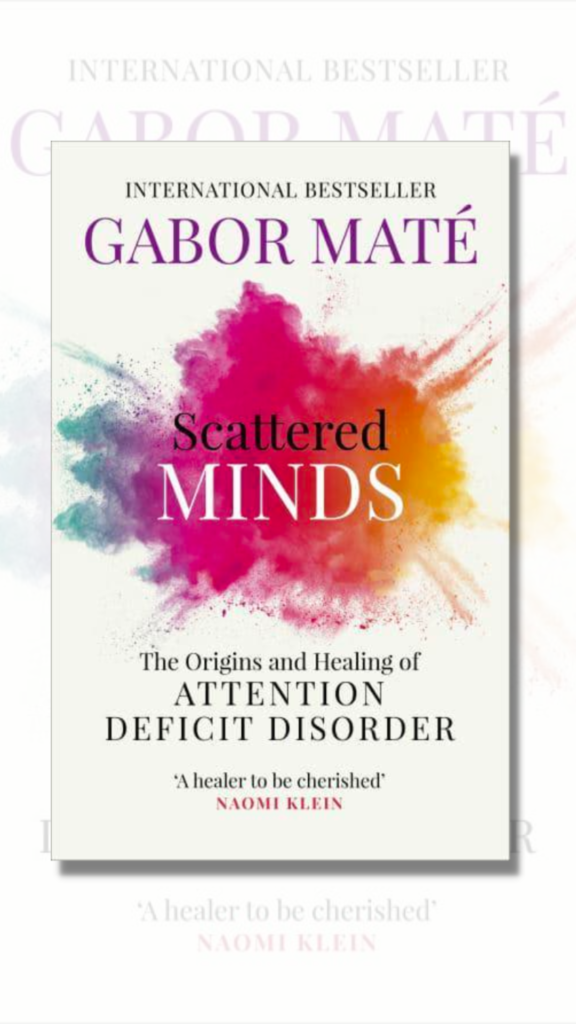
To make him even more relatable, he too, suffers from it and was only diagnosed as an adult in his 50’s. “Scattered Minds” is thought-provoking and full of personal examples from Maté himself and anecdotes from his patients that are incredibly helpful.
Here’s a few quotes that really stuck out to me:
So self-acceptance does not mean self-admiration or even self-liking at every moment of our lives, but tolerance for all our emotions, including those that make us feel uncomfortable.
In reality, everything—from the amniotic fluid that surrounds us in the womb to the words we hear from our parent-figures as children to the air we breathe to the chemicals we ingest—influences our genes, causing some to switch on and others to switch off. We do have a genetic code at birth. But gene expression and repression are influenced by our environment. In other words: our life experiences alter us at the cellular level.
It means little to a young child that the parent feels love for him if that parent keeps disappearing at almost any time. The child experiences a sense of abandonment, a subliminal knowledge that there are things in the world much more important to the parent than he, the child, that he is not worthy of the parent’s attention. He begins to feel, at first unconsciously, that there must be something wrong with him. He also begins to work too hard to get his needs met: demanding contact, acting out or trying to please the parent to gain approval and attention.
“4000 Weeks: Time Management for Mortals” by Oliver Burkeman
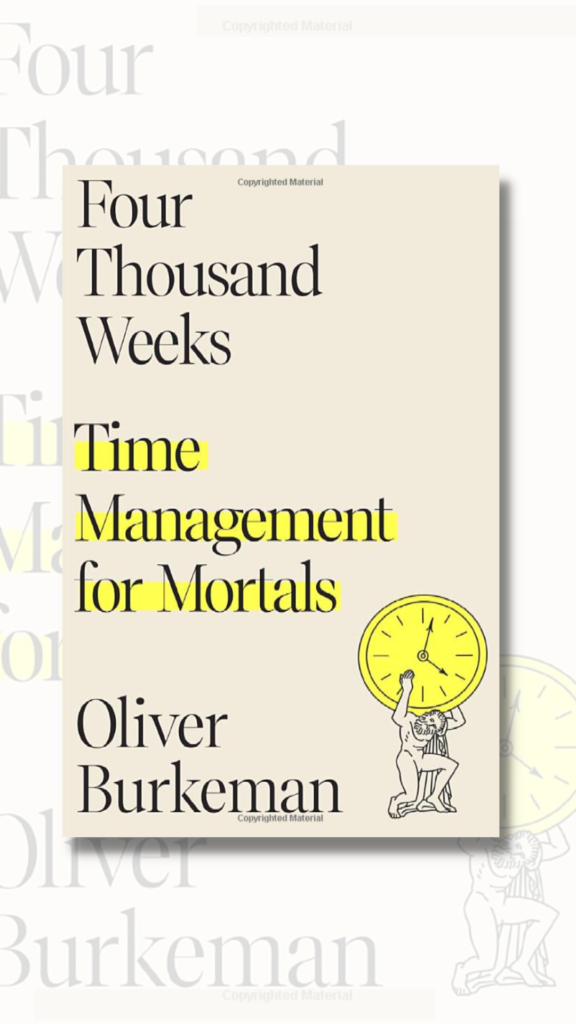
Over the summer I was at a really low point. Not quite depressed, but feeling incredibly lost and anxious about my life and my next move. I happened to be listening to a Tim Ferriss podcast (love Tim!) and he mentioned this book that he said changed his life. I thought woah, if it had that much of an impact on Tim Ferriss, I have to check this out . And oh, Tim, it did not disappoint
I can say without hesitation that reading “Four Thousand Weeks” (which I blew through in 4 days, by the way) changed the course of my life. It’s the reason I started a TikTok account about ADHD and the basis for most of my decisions since September of this year.
The whole premise of the book is that on average, most of us only have about 4,000 weeks to live. If you’re 30, you only have around 2,400 weeks left. That realization alone was enough to bring me to tears. But he goes further than that. Burkeman, who prior to writing his book was a respected journalist who wrote about productivity, admits that he spent a great deal of time trying to maximize every possible second of every day. But it never brought him closer to feeling fulfilled.
The Truth About Productivity
If you make life only about productivity, you’ll always be planning for the future and never actually living in the present. Productivity is a farce. In reality, a fulfilling life is about pouring all of your energy into just a few things and being okay with letting other dreams die. When you have ADHD, you get carried away by big plans a lot, but the reality is you can’t do everything. You will always have to choose something at the expense of something else.
Please forgive the kinda dramatic review but I will recommend this book to everyone until the day I die (which will be here before I know it!).
“Simplicity Parenting: Using the Extraordinary Power of Less to Raise Calmer, Happier, and More Secure Kids” by Kim John Payne
“Simplicity Parenting” is a short, but powerful read I recommend to everyone – parents and non-parents. As a parent, this book taught me the ways in which I can create a more supportive environment for my own children. Studies show if you have ADHD, your children have a 35% chance of developing it as well. Because of this statistic, I’m always on high alert for ways to mitigate this in my own kids as much as possible.
Outside of parenting, I found this book to be incredibly useful for reparenting myself, even if it's not so obviously an ADHD book. I never realized just how much an overly stimulating environment and a lack of time spent in nature could impact my own ADHD. The tips he mentions are practical and apply to both children and adults alike. Here are some examples:
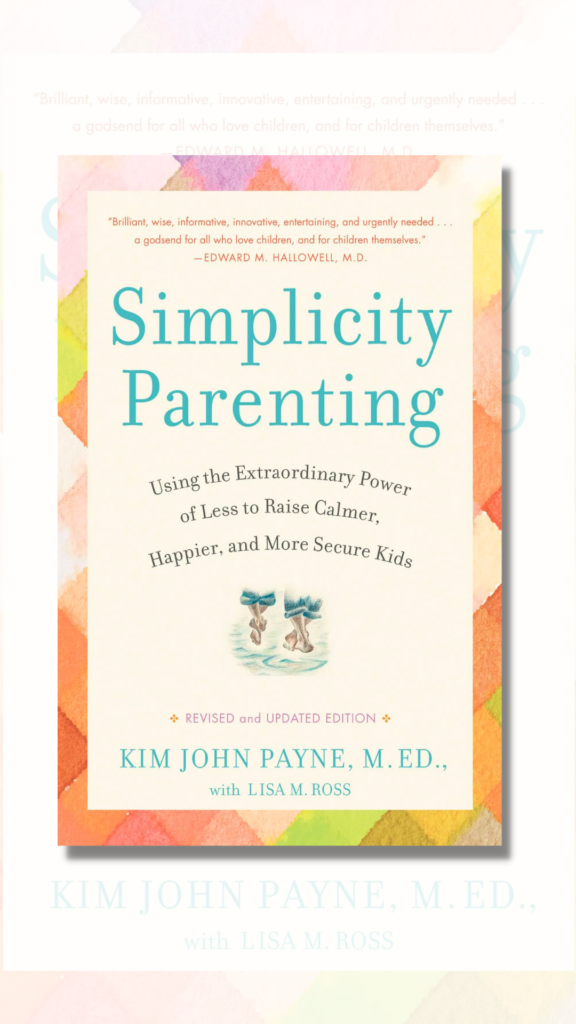
Resist the urge to overschedule. Kids (and adults) need plenty of time to decompress. A playdate or an activity everyday is overkill and can actually exacerbate ADHD symptoms.
Remove clutter. Two or three books on a child’s nightstand is plenty. They don’t need a whole library of books or a 3-4 chests filled with toys in order to have a happy, engaging childhood. I used to think that i always needed to be stimulating my kids – with books, toys, activities, and friends. But I was wrong, what they need is plenty of time to be outside and use their imagination. In other words, less is always more.
“Atomic Habits: An Easy & Proven Way to Build Good Habits & Break Bad Ones” by James Clear
Okay so I know business experts and productivity gurus recommend “Atomic Habits” to death, but it needs a mention here as well because it is so helpful as an ADHD resource, too. Unlike a lot of other self-help books, it wasn’t just theory and fluff, but Clear gives practical advice and anecdotes that helped fill in gaps in my executive functioning.
For example, the concept of habit stacking goes a long way for ADHDers who tend to be forgetful, distracted, and are prone to procrastination. When you use existing habits to develop new ones you want to start, you make it much more likely that you’ll stick with it.
In classic ADHD fashion, I used to be really bad with money. I would constantly overspend, make impulse purchases, and avoided the conversation of budgets like the black plague. Part of the problem was that it felt too overwhelming.
Habit Stacking
“Atomic Habits” helped me come up with a solution through habit stacking: I already had an existing habit of doing my skincare routine in the morning. When you apply a serum, you’re supposed to let it sink in for 2-3 minutes before applying moisturizer. I would usually use this time to scroll on my phone or do some other unproductive activity. Now I use that time to log into the Rocket Money app, categorize any purchases from the day before, and look at my budgets. Making it a stacked habit made it easy and doing it daily removed the fear of checking my bank account only sporadically.
This may not work for everyone, but for me and my ADHD, it’s helpful to check my finances every day because it stays top of mind. It only takes me a few minutes, but saves me hundreds, if not thousands, of dollars a month.
So those are my 6 best ADHD book recommendations. In the words of a viral TikTok post, “the more you fuck around, the more you’re gonna find out.” For the first 10 years after being diagnosed, I really didn’t fuck around with my ADHD at all, and sadly made little progress. But once the floodgates were opened, I became a different person. I still deal with ADHD daily, but I finally feel like I have control over my symptoms, rather than letting them control me 100% of the time. If you’re struggling to find acceptance of your ADHD, hopefully these books can help you fuck around!
Comments +